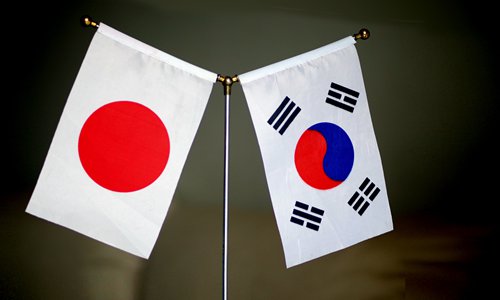HOME >> OPINION
External support needed to repair Japan-South Korea ties
By Chen Yang Source:Global Times Published: 2019/10/27 19:08:40

Photo: IC
On Thursday, Japanese Prime Minister Shinzo Abe held talks with visiting South Korean Prime Minister Lee Nak-yeon who attended the ceremony of Emperor Naruhito's ascension on October 22, according to a report by the Asahi Shimbun.
Abe said that Japan-South Korea relations cannot continue deteriorating, and Lee emphasized that uniting the intelligence of the two countries can overcome the difficulties. Lee also handed over a personal letter from South Korean President Moon Jae-in to Abe.
It is worth noting that it was the first meeting between the Japanese and South Korean government leaders after South Korea's supreme court ordered Japanese companies to compensate 10 Koreans, who were forced labor victims, in October 2018.
After the Japanese government announced in July that it would restrict raw materials exports to South Korea, the South Korean government struck back by cutting off military intelligence sharing with Japan.
In the context of the nationalist support ignited by the two societies, the Japanese and South Korean governments have indeed punished each other with mutual sanctions. However, since the economy of the two countries is highly complementary, the negative impact from the sanctions has gradually emerged.
As for Japan, the number of South Korean tourists to Japan has declined sharply and shown a long-term trend, and Japan's export of goods to South Korea has been greatly affected as well.
For South Korea, the lack of Japanese raw material imports has damaged the supply chain, which has affected the overall economic performance.
It's not hard to find that South Korea is more proactive than Japan in promoting the easing of their relations. Earlier in October, Japan was hit by the super typhoon Hagibis. Moon immediately sent a message of condolence to Abe, which was regarded by the two countries' public opinion as a positive move to improve their relations.
In addition, Moon also sent a personal letter to Emperor Naruhito through diplomatic channels. Dispatching Lee to the enthronement ceremony came after Moon's serious consideration. Known as an expert on Japan, Lee used to be a Tokyo correspondent before he joined the political stage and once worked as chairman of the Japan-Korea Parliamentarians' Union.
Japan, on the other hand, does not seem to be as active as South Korea in repairing their bilateral relations. However, given the fact that the top officials of both sides understand that they cannot allow their relations to deteriorate even further, Japan needs to take measures to effectively interact with South Korea to actually improve their relations.
Lee's latest trip to Japan was a good start, but was not enough as he is only the second-top leader from the Blue House. Only a dialogue between Moon and Abe can have substantial impact on the two countries' relations.
Moreover, it also needs external support to foster Japan-South Korea relations. Since US President Donald Trump's administration is unwilling to mediate in the disputes between Japan and South Korea, there are voices inside both of the two East Asian countries saying that they hope China will play a role.
China can do something together with Japan and South Korea to promote the betterment in Japan-South Korea relations.
For example, at the Ninth China-Japan-South Korea Trilateral Foreign Ministers' Meeting in August, the three sides unanimously adopted the cooperation framework of "China, Japan and South Korea plus X," which not only is conducive to the development of the three countries, but also can contribute to Asia's prosperity and stability.
Last but not the least, Japan and South Korea are geographically and culturally close, and have basically the same political and economic system, living standards and social values. They should be close neighbors, but there has been constant friction between them in recent years. This might be explained by the famous Austrian psychoanalyst Sigmund Freud's thesis "the narcissism of minor differences."
Freud's idea explains that communities with adjoining territories and close relationships are especially likely to engage in feuds and mutually ridicule each other because of hypersensitivity to details of differentiation.
In fact, the differences between Japan and South Korea may not matter so much, but some politicians can gain political dividends by manipulating such small differences, which could be converted into opposition or even hatred.
It is not something that can happen overnight for Japan and South Korea to reach a settlement on historical issues, but it is necessary to be alert to some politicians' manipulation of the small differences between the two countries.
The author is a media professional and an observer of Japan issues. opinion@globaltimes.com.cn
Posted in: VIEWPOINT,ASIAN REVIEW